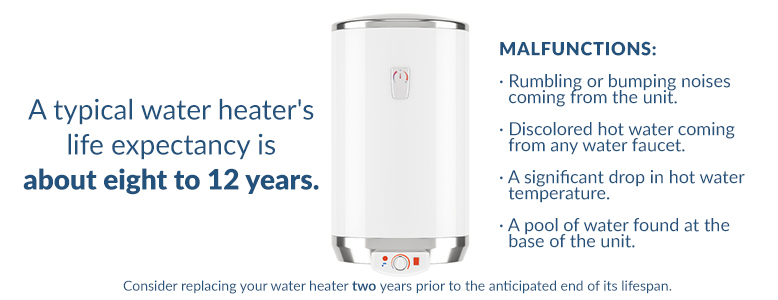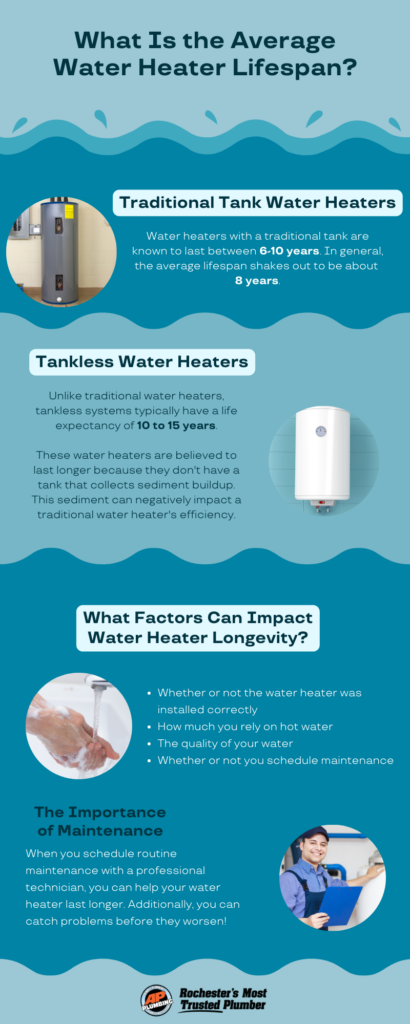Have you ever found yourself stepping into a shower only to be greeted by icy water? It’s a chilling reminder of how crucial your hot water heater is to your daily comfort.
Understanding the average life expectancy of a hot water heater can save you from unexpected cold showers and costly repairs. Whether you’re a homeowner or renter, knowing when it’s time to replace this essential appliance can make a big difference in your home’s efficiency and your peace of mind.
Dive into this guide to discover how long you can expect your hot water heater to last and learn tips to extend its lifespan. Avoid the surprise and keep the warmth flowing smoothly in your home. Curious to find out more? Let’s delve into the details that will help you keep your showers warm and your worries at bay.
Page Contents
Factors Affecting Lifespan
The material of the heater affects its life. Strong materials last longer. Steel is common and strong. Build quality is also key. Well-built heaters break less. Strong connections and seals help a lot.
How often you use the heater matters. Frequent use wears it out faster. Less use means longer life. Overuse leads to quick damage. Give it rest for a longer life.
Good water keeps heaters healthy. Hard water is not good. It has minerals that harm heaters. A water softener can help. This keeps the heater safe and clean.
The place you install the heater matters. Damp areas can rust the heater. Keep it in a dry spot. Good air flow is important too. It keeps the heater cool and safe.

Credit: www.mrrooter.com
Types Of Hot Water Heaters
Tank heatersstore hot water until needed. They usually last 8 to 12 years. Tankless heatersheat water only when used. They can last up to 20 years. Tank heaters are bigger and need more space. Tankless are small and fit anywhere. Tank heaters may run out of hot water. Tankless heaters provide endless hot water.
Electric heatersuse power to heat water. They are quiet and easy to install. They last 10 to 15 years. Gas heatersuse natural gas or propane. They heat water faster. Gas heaters might last 8 to 12 years. Electric heaters are cheaper to buy. Gas heaters may cost less to run. Each has its pros and cons.
Solar modelsuse sunlight to heat water. They save energy but depend on sunny days. They can last up to 20 years. Hybrid modelscombine electric and heat pump technology. They are energy efficient. Hybrid models might last 10 to 15 years. Solar heaters are eco-friendly. Hybrid models are cost-effective.
Signs Of A Failing Water Heater
Water sometimes feels hot, then suddenly cold. Temperature changes can surprise you. This is a sign your heater may be failing. Consistent warmth is important for comfort.
Heater makes odd sounds. Rumbling or popping noises are common. These noises can mean trouble. Check for sediment buildup. It might need fixing soon.
Water looks rusty or brownish. Clear water should be normal. Rusty color can mean rust inside. Rust can lead to leaks. Watch for changes in color.
Water leaks can cause big problems. Corrosion is bad for heaters. Wet spots near heater mean leaks. Fix leaks quickly to prevent damage.

Credit: www.searshomeservices.com
Maintenance Tips
Flushing the water heater removes sediments. This helps it last longer. Do this once a year. It keeps water clear and clean.
The anode rod protects the heater from rust. Check it every year. If it looks worn out, replace it. This can extend the heater’s life.
Insulating the heater keeps it warm. This saves energy. Wrap a blanket around it. This helps in cold months.
Experts can spot problems early. Get a check-up annually. This prevents big issues. Keeps your heater working well.
Replacement Considerations
New heaters use less energy than old ones. This saves money on bills. Look for models with a good energy rating. Energy-efficient heaters help the planet. They use less power. Less power means less pollution.
Cheaper heaters often last fewer years. Expensive ones may last longer. Spending more upfront can save money over time. Think about how long you’ll stay in your home. Longer stay means a better return on investment. Balance cost and lifespan for best value.
Old heaters can harm the environment. Recycling parts helps reduce waste. New models are better for the earth. Less energy use means fewer emissions. Choose a heater with low impact. This helps keep the planet clean. Reduce carbon footprint with smart choices.
Choosing The Right Heater
Family size matters when picking a heater. Small families need less hot water. Larger families need bigger tanks. Think about daily water use. Showers, dishes, and laundry all count. Choose a heater that fits these needs.
Money affects heater choices. Some heaters cost more to buy. Others cost more to run. Electric heaters are cheaper upfront. Gas heaters might save money over time. Pick a heater that fits your budget.
Climate impacts heater choice. Cold places need stronger heaters. Warm places might not. Think about energy sources too. Gas and electricity are common. Some places use solar or wind. Choose the best option for your area.

Credit: applumbing.com
Conclusion
Understanding the average life expectancy of a hot water heater helps plan ahead. Regular maintenance extends its lifespan, saving you money. It’s wise to know signs of wear, like strange noises or rusty water. Early action prevents bigger issues. Replacement is necessary when repairs cost too much.
Choose the right heater for your needs to ensure comfort. A good choice lasts longer and functions efficiently. Check warranties and energy ratings before buying. Investing in a quality unit pays off in the long run. Stay informed and make smart decisions for your home.
